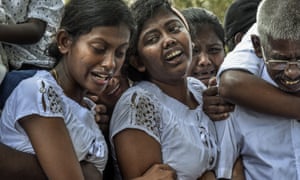Covering the Sri Lanka attacks: ‘It’s about giving voices to the victims’
Posted on May 25th, 2019
Michael Safi Courtesy Guardian (UK)
The Guardian’s South Asia correspondent describes the challenges of reporting the recent atrocities in Sri Lanka and finding the words to justify intrusion into the lives of grieving families

In the immediate moments after the explosion, on a crowded street in Colombo, there was silence; the sound of thousands of people sharply inhaling. Then the screaming started, and people began to run.
It was about five hours after I had landed in Sri Lanka, a day after nine suicide bombers had detonated themselves in churches and hotels across the country. I was outside the blown-out remains of St Anthony’s church, where a few minutes earlier, survivors of the blast had quietly been recounting Sunday morning’s horror.
Suddenly, the fear was back, and columns of families streamed from the densely populated neighbourhood and up the street, unaware at that stage that it was a deliberate detonation by police of a suspicious vehicle believed to be booby-trapped with bombs.
I did not know either, and sought refuge inside an empty car park behind a chain-link fence – squeezing past a reluctant security guard – where I started sending paragraphs of what I was seeing to London.
After a few minutes, a young man also sheltering in the car park approached me. It is better if you go,” he said.
My backpack and laptop were apparently making people nervous – an impression my Middle Eastern appearance probably wasn’t helping to ease. People know these things can carry bombs,” the young man said of my computer.
I wanted to argue, but noticed that a small group was loitering outside the gate, shooting me glances as they talked. I left.
Journalists are never just flies on the wall of a story. In Sri Lanka, when we were not actively scaring people by our presence, we were attending the wakes of children, sitting in the city morgue with families as they identified the remains of their relatives, and surrounding the bereaved as their loved ones were buried in mass funerals.
Whether because of Sri Lankans’ welcoming nature, a different expectation of privacy or journalists’ sheer persistence, the media was granted extraordinary access to the families of victims as they navigated the worst days of their lives.
Afterwards, some of my conversations with other journalists were haunted by questions about our presence in these moments.
To approach a person holding a vigil outside a church where their whole family had been killed, and ask for an interview, I needed more reason than just: this is today’s news
Malcolm Perera, a labourer who said he helped carry people’s remains from St Anthony’s, including 50 bags of body parts, fumbled for words to recount his experience. Occasionally he lapsed into silence and just pointed at the sky and to his head. But he still talked to me and other reporters eager for vivid eyewitness accounts of the event.
Lakshan Anthony’s son was killed and his wife paralysed in the blast at St Sebastian’s. I met him the following Sunday outside the church, where he had come in defiance of security warnings to mark the occasion. At the stroke of 8.45am – the moment the first bombs had exploded – St Sebastian’s bells began to ring. Anthony stood outside the church fence, clenching his fists.
Both men needed emotional support. What they got was a journalist. I listened to them patiently, giving my time and attention. But I was also gathering material. Weighing the quality of the information I was getting. Empathising with the families of the dead – on a deadline.
Perhaps the only people with the right to look at images of suffering of this extreme order are those who could do something to alleviate it,” mused the American essayist Susan Sontag about popular representations of war and violence.
Say, the surgeons at the military hospital where the photograph was taken – or those who could learn from it. The rest of us are voyeurs, whether or not we mean to be.”
Another journalist I discussed this with shared her own discomfort at the sight of a group of photographers, walking backwards in front of families at a mass funeral, and accidentally treading on freshly dug graves. It was natural to feel appalled.
But then she saw photos of the scene on the front page of a newspaper the next day: a close-up of a mourner’s face wrenched in anguish and grief; a moving and powerful testament.
A few weeks after leaving Sri Lanka, I have gone back over mine and other people’s stories and read them differently. I can see the value. Respectful and sensitive reporting can give voices and faces to those who might otherwise have been abstract victims of some far-off tragedy. It bears witness, making apparent a shared moral responsibility. It asserts, against the fogging effect of time or deliberate denial, that in the words of the Italian writer Primo Levi: These things happened: This is true. This is my word for it.”
I assure you, these are not issues that arise in the day-to-day routine of reporting from south Asia. Bearing witness was far from my mind when I wrote about Indian movie buffs stealing milk to pour on posters of their film idols, Kerala’s burgeoning jackfruit industry, or the app that blocks access to porn sites and replaces them with Hindu devotional music.
But to approach a person holding vigil outside the church where their entire family has been killed, and ask for an interview, I found I needed more reason than merely: this is today’s news.
The world being what it is, Sri Lanka’s tragedy is unlikely to be the last I see up close. If and when that happens, I will go and cover it. And maybe later I will see it was worthwhile. But I don’t think it will ever get more comfortable. It shouldn’t.